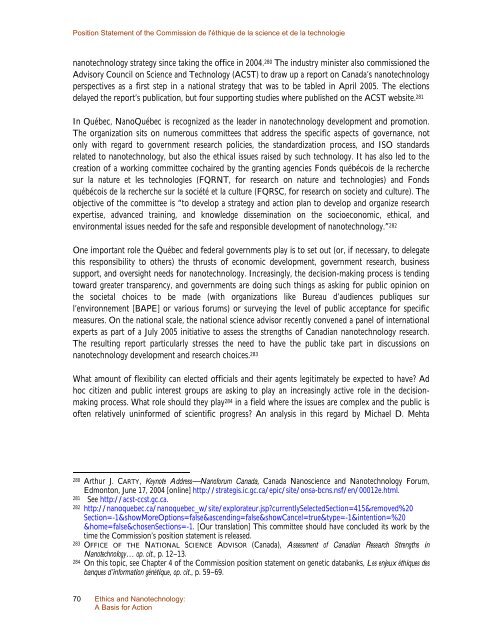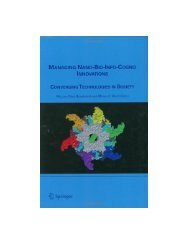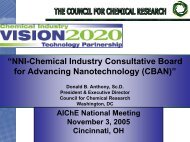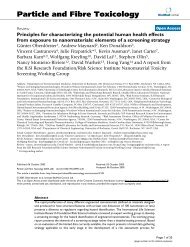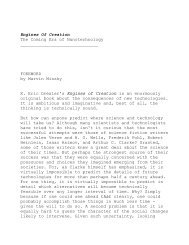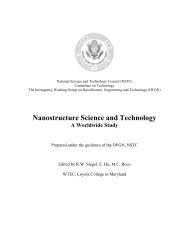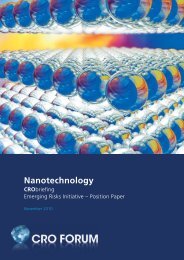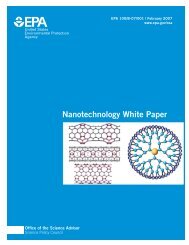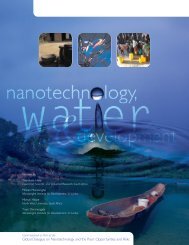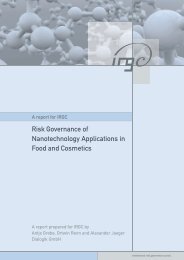A Basis for Action - Commission de l'éthique de la science et de la ...
A Basis for Action - Commission de l'éthique de la science et de la ...
A Basis for Action - Commission de l'éthique de la science et de la ...
You also want an ePaper? Increase the reach of your titles
YUMPU automatically turns print PDFs into web optimized ePapers that Google loves.
Position Statement of the <strong>Commission</strong> <strong>de</strong> l'éthique <strong>de</strong> <strong>la</strong> <strong>science</strong> <strong>et</strong> <strong>de</strong> <strong>la</strong> technologie<br />
nanotechnology strategy since taking the office in 2004. 280 The industry minister also commissioned the<br />
Advisory Council on Science and Technology (ACST) to draw up a report on Canada’s nanotechnology<br />
perspectives as a first step in a national strategy that was to be tabled in April 2005. The elections<br />
<strong>de</strong><strong>la</strong>yed the report’s publication, but four supporting studies where published on the ACST website. 281<br />
In Québec, NanoQuébec is recognized as the lea<strong>de</strong>r in nanotechnology <strong>de</strong>velopment and promotion.<br />
The organization sits on numerous committees that address the specific aspects of governance, not<br />
only with regard to government research policies, the standardization process, and ISO standards<br />
re<strong>la</strong>ted to nanotechnology, but also the <strong>et</strong>hical issues raised by such technology. It has also led to the<br />
creation of a working committee cochaired by the granting agencies Fonds québécois <strong>de</strong> <strong>la</strong> recherche<br />
sur <strong>la</strong> nature <strong>et</strong> les technologies (FQRNT, <strong>for</strong> research on nature and technologies) and Fonds<br />
québécois <strong>de</strong> <strong>la</strong> recherche sur <strong>la</strong> société <strong>et</strong> <strong>la</strong> culture (FQRSC, <strong>for</strong> research on soci<strong>et</strong>y and culture). The<br />
objective of the committee is “to <strong>de</strong>velop a strategy and action p<strong>la</strong>n to <strong>de</strong>velop and organize research<br />
expertise, advanced training, and knowledge dissemination on the socioeconomic, <strong>et</strong>hical, and<br />
environmental issues nee<strong>de</strong>d <strong>for</strong> the safe and responsible <strong>de</strong>velopment of nanotechnology.” 282<br />
One important role the Québec and fe<strong>de</strong>ral governments p<strong>la</strong>y is to s<strong>et</strong> out (or, if necessary, to <strong>de</strong>legate<br />
this responsibility to others) the thrusts of economic <strong>de</strong>velopment, government research, business<br />
support, and oversight needs <strong>for</strong> nanotechnology. Increasingly, the <strong>de</strong>cision-making process is tending<br />
toward greater transparency, and governments are doing such things as asking <strong>for</strong> public opinion on<br />
the soci<strong>et</strong>al choices to be ma<strong>de</strong> (with organizations like Bureau d’audiences publiques sur<br />
l’environnement [BAPE] or various <strong>for</strong>ums) or surveying the level of public acceptance <strong>for</strong> specific<br />
measures. On the national scale, the national <strong>science</strong> advisor recently convened a panel of international<br />
experts as part of a July 2005 initiative to assess the strengths of Canadian nanotechnology research.<br />
The resulting report particu<strong>la</strong>rly stresses the need to have the public take part in discussions on<br />
nanotechnology <strong>de</strong>velopment and research choices. 283<br />
What amount of flexibility can elected officials and their agents legitimately be expected to have? Ad<br />
hoc citizen and public interest groups are asking to p<strong>la</strong>y an increasingly active role in the <strong>de</strong>cisionmaking<br />
process. What role should they p<strong>la</strong>y 284 in a field where the issues are complex and the public is<br />
often re<strong>la</strong>tively unin<strong>for</strong>med of scientific progress? An analysis in this regard by Michael D. Mehta<br />
280 Arthur J. CARTY, Keynote Address—Nano<strong>for</strong>um Canada, Canada Nano<strong>science</strong> and Nanotechnology Forum,<br />
Edmonton, June 17, 2004 [online] http://strategis.ic.gc.ca/epic/site/onsa-bcns.nsf/en/00012e.html.<br />
281 See http://acst-ccst.gc.ca.<br />
282 http://nanoquebec.ca/nanoquebec_w/site/explorateur.jsp?currentlySelectedSection=415&removed%20<br />
Section=-1&showMoreOptions=false&ascending=false&showCancel=true&type=-1&intention=%20<br />
&home=false&chosenSections=-1. [Our trans<strong>la</strong>tion] This committee should have conclu<strong>de</strong>d its work by the<br />
time the <strong>Commission</strong>’s position statement is released.<br />
283 OFFICE OF THE NATIONAL SCIENCE ADVISOR (Canada), Assessment of Canadian Research Strengths in<br />
Nanotechnology… op. cit., p. 12–13.<br />
284 On this topic, see Chapter 4 of the <strong>Commission</strong> position statement on gen<strong>et</strong>ic databanks, Les enjeux éthiques <strong>de</strong>s<br />
banques d’in<strong>for</strong>mation génétique, op. cit., p. 59–69.<br />
70 Ethics and Nanotechnology:<br />
A <strong>Basis</strong> <strong>for</strong> <strong>Action</strong>


